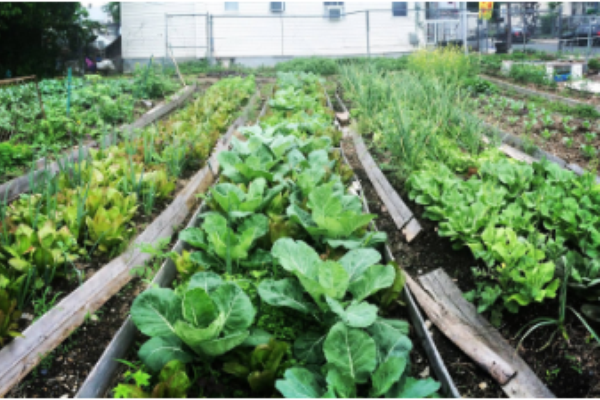Community gardens provide reliable sources of healthy food and income, and they help communities revitalize and reclaim their neighborhoods. But even established sites of urban food production face legal difficulties that can make them difficult to sustain – not the least of which is the difficulty faced by community groups and individuals seeking to grow food on public and private vacant and abandoned property.
In 2011, the Public Interest Law Center of Philadelphia launched the Garden Justice Legal Initiative (GJLI), with support from the Skadden Fellowship Foundation. The goal of the project is to provide pro bono legal support, policy research and advocacy, and community education and organizing to community gardeners and market farmers in the Philadelphia region. Through GJLI, we provide direct representation to clients.
The GJLI also connects community gardens with pro bono counsel to expand capacity and increase representation of gardens. Through community education, we engage with more than 200 people each year, providing tools to advocate for the right to use and build community on land in their neighborhoods. We also provide a web mapping and organizing tool – Grounded in Philly, www.groundedinphilly.org – that provides access to data on vacant land throughout Philadelphia and offers resources to individuals interested in starting or preserving community-based vacant land projects.
The GJLI’s director and community organizer have worked with numerous partners to successfully organize and grow a network of farmers, gardeners, and their neighbors, as well as community-based organizations and city officials, to build a strong, citywide voice for urban agriculture and garden and open space preservation, including the Soil Generation coalition. Over the past two years, the GJLI has provided key policy research and analysis on urban agriculture, garden and open space policy in Philadelphia, rooted in the needs of current clients, as well as concerns raised by community leaders and city agencies.
Through the advocacy of the GJLI and its partners, Philadelphia City Council unanimously approved a Philadelphia Land Bank bill designed to provide a transparent, streamlined and equitable process through which the city can manage the more than 40,000 vacant properties and support a range of development and community-driven productive uses. This work is carried out in collaboration with residents, community-based organizations, partner nonprofits, city agencies and other municipal authorities.
In 2011, the Public Interest Law Center of Philadelphia launched the Garden Justice Legal Initiative (GJLI), with support from the Skadden Fellowship Foundation. The goal of the project is to provide pro bono legal support, policy research and advocacy, and community education and organizing to community gardeners and market farmers in the Philadelphia region. Through GJLI, we provide direct representation to clients.
The GJLI also connects community gardens with pro bono counsel to expand capacity and increase representation of gardens. Through community education, we engage with more than 200 people each year, providing tools to advocate for the right to use and build community on land in their neighborhoods. We also provide a web mapping and organizing tool – Grounded in Philly, www.groundedinphilly.org – that provides access to data on vacant land throughout Philadelphia and offers resources to individuals interested in starting or preserving community-based vacant land projects.
The GJLI’s director and community organizer have worked with numerous partners to successfully organize and grow a network of farmers, gardeners, and their neighbors, as well as community-based organizations and city officials, to build a strong, citywide voice for urban agriculture and garden and open space preservation, including the Soil Generation coalition. Over the past two years, the GJLI has provided key policy research and analysis on urban agriculture, garden and open space policy in Philadelphia, rooted in the needs of current clients, as well as concerns raised by community leaders and city agencies.
Through the advocacy of the GJLI and its partners, Philadelphia City Council unanimously approved a Philadelphia Land Bank bill designed to provide a transparent, streamlined and equitable process through which the city can manage the more than 40,000 vacant properties and support a range of development and community-driven productive uses. This work is carried out in collaboration with residents, community-based organizations, partner nonprofits, city agencies and other municipal authorities.
